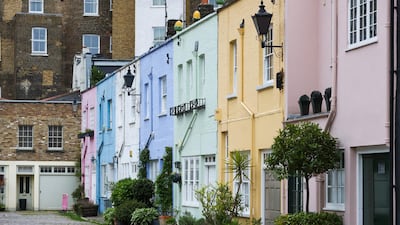British house prices rose by the most since 2004, jumping 13.4 per cent in June, compared with the same month a year ago, as demand stayed buoyant in the run-up to the stamp duty deadline.
In monthly terms, house prices were up 0.7 per cent on May, taking the average to £245,432 ($340,010) as buyers rushed to lock in the tax break offered by Chancellor of the Exchequer Rishi Sunak, which expires on June 30.
"While the strength is partly due to base effects, with June last year unusually weak due to the first lockdown, the market continues to show significant momentum," Nationwide's chief economist Robert Gardner said on Tuesday.
Britain's housing market has strengthened since Mr Sunak introduced the stamp duty holiday in July last year, after the shutdown of the property sector at the start of the pandemic.
The tax break offered buyers a saving of up to £15,000 on the first £500,000 of a property purchase.
Prices rose by 8.5 per cent last year and continued their upward trajectory after the tax break was extended in March.
The surge is also helping the super-prime market in central London to recover, with purchasers with a combined budget of £36.8 billion seeking homes in the capital worth more than £10 million, according to Knight Frank, as the quest for more space amid the remote-working trend influences buying decisions.
In the six months to the end of April, £817.4m was spent on super-prime property in London, 21 per cent higher than the figure recorded in the preceding six months, with 45 deals completed.
Buyers from the Middle East are playing a more active role in the UK market, said Knight Frank, accounting for 16 per cent of all UK property sold to overseas buyers in the first three months of this year.
This is the highest proportion of Middle East interest since the start of the pandemic in the UK.
While investment from the region is still below pre-Covid levels, activity is expected to pick up once international travel restrictions ease.
"From the Middle East, we are seeing pent-up demand for London's super-prime property that we hope will be released as travel opens. The volumes of our inquiries for £10m-plus properties throughout central and outer London have lifted in recent months," said Henry Faun of Knight Frank.
“Based on the 12-month rolling average, in May 2021 there were 8.7 new buyers for every new super-prime property listed for sale. This was the highest figure in seven years and, in parallel, average super-prime prices increased by 0.6 per cent in the year to May, which was the first rise in more than three years.”
Danni Hewson, financial analyst at AJ Bell, said the June rise in UK house prices comes as no surprise as buyers rush to complete deals before the stamp duty holiday expires at midnight on Wednesday.
“Figures from Nationwide do show the rate of those price hikes is slowing, up just 0.7 per cent in June, compared with 1.7 per cent in May, but the average house price is now a record £245,432.
“That number is important because it will still qualify for the nil-rate band under the stamp duty holiday, keeping the fires kindled until the end of September.”
From July 1, the threshold for the stamp duty holiday drops to £250,000 until September 1.
However, Ms Hewson said other factors fuelling the market include low interest rates and the availability of low deposit deals.
"The pandemic has also spurred the market on, changing our preferences. What was top of people's wish lists two years ago is a distant memory with the potential to spin out working from home indefinitely or, at least, on a part-time basis, expanding the geographical map for many and adding home office to the list of demands," she said.
“This shift is unlikely to revert back and is expected to keep the market toasty for the months to come. The X factor will be unemployment. How many people will still be in a job once the furlough scheme ends? How many mortgage holidays will result in quick sales? There is no getting away from the fact that the next few months will be difficult for many people once support is withdrawn.”


